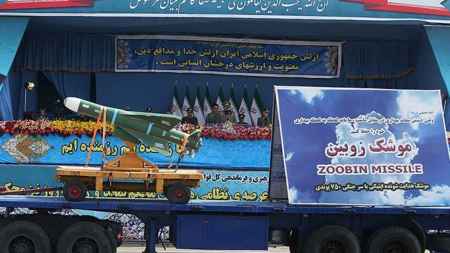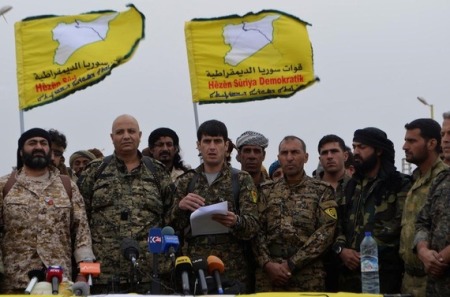The Real Winner in the Russia Investigations Is Iran, PJ Media, Roger L Simon, March 30, 2017

The best interests of the United States would be to woo Russia away from these maniacs — and we very well could have. We are, at least for now, still the world’s biggest GNP and control a great deal of the global economy. Greedy despots like Putin know that as well as anybody. They may not feel good about it, but to some degree they might play with us. And if they wanted to enough, if we sweetened the pot enough, they’d even disengage from the mullahs, leaving them with no ally of value, no substantial defender.
Trump — or some people close to him — may have had this in mind when they started speaking with the Russians way back in the Paleolithic Era of the transition days. They’d have been fools not to. They wouldn’t have been doing their duty to the United States or to the civilized world for that matter.
Now Trump or his people can no longer even consider making such inroads. They would be accused immediately of treason or something close. The possibility of separating the Russians from Iran has been destroyed by these investigations — first by the House, now by the Senate, and always by the media.
*****************************
While the Evil Party and the Stupid Party continue to bludgeon each other into extinction over whether Putin was manipulating our election, the real winner from our politicians’ current endless Russia-fixation is the Islamic Republic of Iran.
Sound like a stretch? Not at all. The reasons should be evident.
Russia is not rich. It currently ranks 12th in overall GNP, about even with Australia, which has roughly one-seventh Russia’s population. It’s a dismal 47th in per capita GNP — unimpressive, to say the least, for the world’s largest country with immense natural resources spread over 11 time zones.
And things have not been looking up. Their population has been declining since 1991. The price of oil — by far their largest export -0 is down. Making matters worse, Donald Trump, allegedly Putin’s best friend, has opened the U.S. energy spigots, threatening to drive that price even lower. (Putin would have done a lot better with Hillary’s anti-fracking position, assuming that wasn’t a phony.)
Yes, they have a powerful nuclear arsenal with potent missiles to deliver them, but Russia needs friends, badly — especially to shore up its forces in the seemingly never-ending civil war in Syria. Enter Iran. From Reuters Monday:
Iran’s president met Russia’s prime minister on Monday in a bid to develop a warming relationship that has been greatly strengthened by both sides’ involvement on the same side of the war in Syria.
Beginning a visit to Moscow, President Hassan Rouhani told Prime Minister Dmitry Medvedev: “I hope that a new turning-point in the development of our relations will be reached.”
Iranian arms purchases and Russian investment in the Iranian energy sector are likely talking points for Rouhani, less than two months before Iran’s May 19 presidential election.
Iranian media say he will discuss several economic agreements – potentially valuable prizes for the moderate leader [sic], who is keen to show his people that Iran is benefiting from its 2015 deal with world powers to rein back its nuclear programme in returning for an easing of international sanctions.
Aside from Reuters’ credulous nonsense that Rouhani is in any way moderate, where did all the mullahs’ new deal-making money come from in the first place? Well, we know. Iran, for reasons still unfathomable, received huge amounts — sometimes in cold, hard cash — from the Obama administration after the Iran deal and later apparently to preserve it. (The contents of that deal, unknown to all but a few, are what really deserve a congressional investigation, not the present kangaroo court.) What did the mullahs do with the cash? Help their impoverished citizens or buy $10 billion worth of modern weapons from the Russians? Well, we know that too. Obama’s deal helped create a match made in Hell.
And the worse part of this Hellish match is Iran, not Russia (although she’s no picnic). Vladimir Putin is obviously a dictatorial plutocrat with massive ambitions, but he’s more or less sane. The mullahs of Iran are also dictatorial plutocrats, but they’re not (sane). Some of them believe absolutely delusional theories dreamed up in the seventh century and have set out to prove them true — in Iran, in Syria, in Yemen, in North Korea, in South America, and on and on. They are as crazy as ISIS and far more dangerous because they already have a large country from which to enact their imperialist/millennialist fantasies.
The best interests of the United States would be to woo Russia away from these maniacs — and we very well could have. We are, at least for now, still the world’s biggest GNP and control a great deal of the global economy. Greedy despots like Putin know that as well as anybody. They may not feel good about it, but to some degree they might play with us. And if they wanted to enough, if we sweetened the pot enough, they’d even disengage from the mullahs, leaving them with no ally of value, no substantial defender.
Trump — or some people close to him — may have had this in mind when they started speaking with the Russians way back in the Paleolithic Era of the transition days. They’d have been fools not to. They wouldn’t have been doing their duty to the United States or to the civilized world for that matter.
Now Trump or his people can no longer even consider making such inroads. They would be accused immediately of treason or something close. The possibility of separating the Russians from Iran has been destroyed by these investigations — first by the House, now by the Senate, and always by the media. They go on and on even though there has been no genuine evidence of collusion between the Trump team and the Russians. By now it’s like a bad mini-series that somehow wound its way onto your Netflix queue and you can’t get rid of it. Eventually, I suppose, someone, somewhere will be caught with his or her hand in the cookie jar. It will be highly ambiguous and most likely for minor personal gain, but nevertheless he or she will will be endlessly excoriated in the press, ever anxious to prove themselves right. But it will all be a meaningless waste of time in the end.
Meanwhile, Iran has won big.
Still, there has been one valuable piece of information to emerge from this pointless muddle. Which leads me to a last question. Who, in the final analysis, spied more on our government — Putin or Obama? I bloviate. You decide.

















Recent Comments